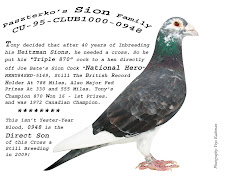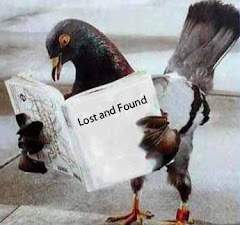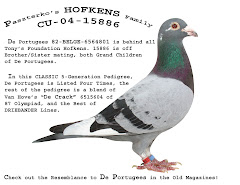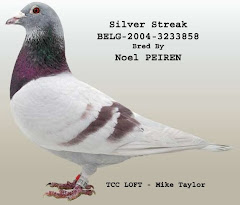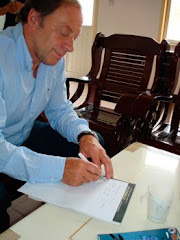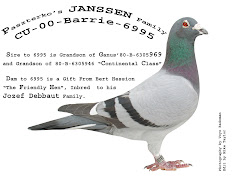Written By Peter Cheney, Toronto Star
May 8, 1993
The pigeons are flying now, blurred gray shapes against the blue spring sky, rising up past the television antennas and the patched, narrow roofs. "Can you see them"? he asks. The flock is circling, banking hard around the chimneys, like miniature racing planes. "They're coming back now," he says. "Watch. A few will come, then the rest."
Elmer MacDonald is 70 years old. He's been blind since he was 22, but he can still remember the way the pigeons look up in the sky, a sight fixed in his memory ever since he was a little boy, when his father raised pigeons in the backyard.
This year will be his 61st pigeon racing season. "I'm a poor man," he says. "But I have my birds ... Racing pigeons are the poor man's racehorse." There are about 2,000 pigeon racers in Canada, mostly men, most of them middle-aged or older, passionately addicted to a sport that most people have never heard of or understand.
"When you tell people you race pigeons they give you weird looks," says Bill Baderow, President of the Canadian Racing Pigeon Union. "They think about the pigeons they see sitting around on statues. "It gets in your blood. I've been doing this for 42 years and I still get all excited about it." The Ontario pigeon racing season begins today with a 160 kilometer (100 mile) training race from Burk's Falls, north of Huntsville, the opener to a season that climaxes in July with the Upper Canada National 400 miler, Ontario pigeon racing's equivalent of the Kentucky Derby.
Unlike the Derby, the Upper Canada offers no prize money. Despite this, it is the most hotly contested and prestigious pigeon race in the province, attracting almost 3,000 birds last year. Although some Canadian pigeon races have cash purses, they are small - the highest is about $2000. In Europe, however, there are races with prizes that can run to $100,000 and more. Big or small, pigeon races all work the same way: the winner is determined by calculating the bird's average speed over the course.
On the night before the event, the racers take their pigeons to their local club. Each racer has a special pigeon racing clock, which is calibrated and locked at the club. Each bird is given a special leg band then loaded into a semi-trailer truck to be taken to the release point. The racers wait at home as the pigeons fly. When they arrive, they remove the bird's leg band and drop it through a hole in the top of their racing clock, which locks shut and records the time. The distance from the release point to each racer's home is known down to the meter. Dividing the distance by the bird's time en route gives an average speed, which may be as high as 100 kilometres (62 miles) an hour or more.
MacDonald lives in Toronto's east end, in a small house on Carlaw Ave. just north of Lake Shore Blvd. In the 1950's MacDonald kept up to 400 birds at once. But now he's down to 80 or so. "I'm an old man now," he says. "I can't keep up with all those birds any more." His pigeon loft is a weather beaten, two-storey structure that looks like a child's fort. MacDonald keeps his racing birds on the top level, which he reaches by a set of rickety wooden steps with no railing. In the lower level are MacDonald's breeder birds, the hens and studs that supply him with new stock.
MacDonald does his racing on a budget. Most of his birds are hand-me-downs given to him by friends. This makes it tough to compete with wealthy racers who may spend hundreds - and in some cases thousands - of dollars to buy a single bird. "Even in pigeon racing, the rich man has a leg up," says MacDonald. Like horse fanciers bidding on a potential Man O'War or Northern Dancer, wealthy pigeon racers will spend astronomical sums to acquire winning genes. High-profile racers in Europe and the British Isles commonly spend $10,000 and more for birds from breeders such as the fabled Janssens of Belgium. "You can't even touch a Janssen's egg for less than $1,000," says MacDonald. But prices can go far higher. In Europe, where pigeon racing is big business, it's not unheard of to spend $150,000 on a prize bird. And last year, a new high-water mark was set when a Japanese racer paid $250,000 for a single pigeon.
One of MacDonald's fellow racers offers insight into the soaring prices; "You could go out into the country and buy a horse for a couple of hundred bucks," he says. "For that price, it would have four legs and it would be alive. But if you wanted to buy Secretariat, you'd pay a little more."
MacDonald watches the escalating cost of pigeons with the bemused detachment of a cottage-country boater watching the America's Cup: "I've got no money. All I've got is my smarts and my experience."
The most MacDonald ever spent on a pigeon was $300, when he bought a Produda stud from a Minnesota breeder. "He was one hell of a bird," says MacDonald. "He was a real producer. Everyone I knew wanted him." The eternal quest for the perfect bird is the holy grail of pigeon racing. In the Canadian Racing Pigeon Union Year book, for example, a tome about half the thickness of the Toronto phone book, there are hundreds of advertisements placed by breeders touting their blood-lines. The Jojos Loft, for example, has an ad that features photos of some of its top studs, whose ancestry includes such legendary birds as Terminator (half brother of the fabled General), De Bull - "The Super breeder" - and Pickering's very own Fighter - "Winner of 25 prizes."
The reverence that pigeon racers bring to the breeding process is made clear by the advertisement of Ontario breeder Silvio Matacchione, who advertises his fabulous Spanjaards, a line of birds he has maintained following the death of their legendary creator. "If individual birds were great paintings then one could consider Mr. Gerrit Spanjaards in the same spirit as that other great Dutch Master Vincent van Gogh," writes Matacchione. "Both created wonderful images, reflections of their own inner souls. So it is in this spirit that I now pick up Spanjaards' brush and continue his work."
THEY'RE AT THE POST: Elmer MacDonald, 70, prepares one of his birds for duty while several other feathered friends hang around. MacDonald, who is blind, has been racing pigeons for 61 years. Today marks the start of racing season.
The great mystery of pigeon racing, of course, is how the birds find their way home. Racing pigeons are trained by releasing them at increasing distances from their home loft, beginning with "tosses" of just a few kilometres. But this only hones an existing ability. "I've been around pigeons a lot of years, and I still don't really know how they do it," says MacDonald. "It's just instinct, pure and simple. It's the same thing that brings the salmon back." Every racer expects to lose a certain number of birds to the classic hazards - predatory hawks and power lines. Flying at 100 km/h or more, often at low altitude to escape higher winds aloft, pigeons often suffer crippling, even fatal, injuries when they hit wires.
MacDonald has spent so much time with pigeons, and has learned so much about them, that he sometimes wonders if he isn't part pigeon himself. And perhaps he is: in World War II he was a motorcycle dispatch rider, homing in on distant locations marked only by a "X" on a topographical map. In 1944, he was blinded when a shell exploded near him. His blindness plunged him into a severe depression. "At first, all I did was sit on the porch," he says. "But then I figured I better snap out of it - I had the rest of my life to live."
He had other disappointments, too. When he was in his 40's, his wife left him and their five children. MacDonald had worked for years at the near by Continental Can company, but had to quit because he couldn't afford a babysitter. He raised his children on his veteran's pension. But always, he kept at least a few pigeons out back. And he had some triumphs. His biggest win came in 1957, when one of his birds came first in the Toronto Federation Derby, a 495 kilometre (309 mile) race from Montpelier, Illinois. MacDonald's prize money came to $852.
The city, and the world around it, has changed since MacDonald began racing pigeons: "It was different then," he says. "everybody had pets - rabbits, birds, you name it. Now, the city goes crazy if you try to keep anything." But still, MacDonald keeps the pigeon-racing faith, year after year. "It's my hobby," he says. :What would I do without it? Die, probably."
Past sports promotions
Pigeon racing
"When you tell people you race pigeons they give you weird looks," says Bill Baderow, President of the Canadian Racing Pigeon Union. "They think about the pigeons they see sitting around on statues. "It gets in your blood. I've been doing this for 42 years and I still get all excited about it." The Ontario pigeon racing season begins today with a 160 kilometer (100 mile) training race from Burk's Falls, north of Huntsville, the opener to a season that climaxes in July with the Upper Canada National 400 miler, Ontario pigeon racing's equivalent of the Kentucky Derby.
Unlike the Derby, the Upper Canada offers no prize money. Despite this, it is the most hotly contested and prestigious pigeon race in the province, attracting almost 3,000 birds last year. Although some Canadian pigeon races have cash purses, they are small - the highest is about $2000. In Europe, however, there are races with prizes that can run to $100,000 and more. Big or small, pigeon races all work the same way: the winner is determined by calculating the bird's average speed over the course.
On the night before the event, the racers take their pigeons to their local club. Each racer has a special pigeon racing clock, which is calibrated and locked at the club. Each bird is given a special leg band then loaded into a semi-trailer truck to be taken to the release point. The racers wait at home as the pigeons fly. When they arrive, they remove the bird's leg band and drop it through a hole in the top of their racing clock, which locks shut and records the time. The distance from the release point to each racer's home is known down to the meter. Dividing the distance by the bird's time en route gives an average speed, which may be as high as 100 kilometres (62 miles) an hour or more.
Pigeon racers fanatical about their sport
MacDonald lives in Toronto's east end, in a small house on Carlaw Ave. just north of Lake Shore Blvd. In the 1950's MacDonald kept up to 400 birds at once. But now he's down to 80 or so. "I'm an old man now," he says. "I can't keep up with all those birds any more." His pigeon loft is a weather beaten, two-storey structure that looks like a child's fort. MacDonald keeps his racing birds on the top level, which he reaches by a set of rickety wooden steps with no railing. In the lower level are MacDonald's breeder birds, the hens and studs that supply him with new stock.
MacDonald does his racing on a budget. Most of his birds are hand-me-downs given to him by friends. This makes it tough to compete with wealthy racers who may spend hundreds - and in some cases thousands - of dollars to buy a single bird. "Even in pigeon racing, the rich man has a leg up," says MacDonald. Like horse fanciers bidding on a potential Man O'War or Northern Dancer, wealthy pigeon racers will spend astronomical sums to acquire winning genes. High-profile racers in Europe and the British Isles commonly spend $10,000 and more for birds from breeders such as the fabled Janssens of Belgium. "You can't even touch a Janssen's egg for less than $1,000," says MacDonald. But prices can go far higher. In Europe, where pigeon racing is big business, it's not unheard of to spend $150,000 on a prize bird. And last year, a new high-water mark was set when a Japanese racer paid $250,000 for a single pigeon.
One of MacDonald's fellow racers offers insight into the soaring prices; "You could go out into the country and buy a horse for a couple of hundred bucks," he says. "For that price, it would have four legs and it would be alive. But if you wanted to buy Secretariat, you'd pay a little more."
MacDonald watches the escalating cost of pigeons with the bemused detachment of a cottage-country boater watching the America's Cup: "I've got no money. All I've got is my smarts and my experience."
The most MacDonald ever spent on a pigeon was $300, when he bought a Produda stud from a Minnesota breeder. "He was one hell of a bird," says MacDonald. "He was a real producer. Everyone I knew wanted him." The eternal quest for the perfect bird is the holy grail of pigeon racing. In the Canadian Racing Pigeon Union Year book, for example, a tome about half the thickness of the Toronto phone book, there are hundreds of advertisements placed by breeders touting their blood-lines. The Jojos Loft, for example, has an ad that features photos of some of its top studs, whose ancestry includes such legendary birds as Terminator (half brother of the fabled General), De Bull - "The Super breeder" - and Pickering's very own Fighter - "Winner of 25 prizes."
The reverence that pigeon racers bring to the breeding process is made clear by the advertisement of Ontario breeder Silvio Matacchione, who advertises his fabulous Spanjaards, a line of birds he has maintained following the death of their legendary creator. "If individual birds were great paintings then one could consider Mr. Gerrit Spanjaards in the same spirit as that other great Dutch Master Vincent van Gogh," writes Matacchione. "Both created wonderful images, reflections of their own inner souls. So it is in this spirit that I now pick up Spanjaards' brush and continue his work."
THEY'RE AT THE POST: Elmer MacDonald, 70, prepares one of his birds for duty while several other feathered friends hang around. MacDonald, who is blind, has been racing pigeons for 61 years. Today marks the start of racing season.
The great mystery of pigeon racing, of course, is how the birds find their way home. Racing pigeons are trained by releasing them at increasing distances from their home loft, beginning with "tosses" of just a few kilometres. But this only hones an existing ability. "I've been around pigeons a lot of years, and I still don't really know how they do it," says MacDonald. "It's just instinct, pure and simple. It's the same thing that brings the salmon back." Every racer expects to lose a certain number of birds to the classic hazards - predatory hawks and power lines. Flying at 100 km/h or more, often at low altitude to escape higher winds aloft, pigeons often suffer crippling, even fatal, injuries when they hit wires.
MacDonald has spent so much time with pigeons, and has learned so much about them, that he sometimes wonders if he isn't part pigeon himself. And perhaps he is: in World War II he was a motorcycle dispatch rider, homing in on distant locations marked only by a "X" on a topographical map. In 1944, he was blinded when a shell exploded near him. His blindness plunged him into a severe depression. "At first, all I did was sit on the porch," he says. "But then I figured I better snap out of it - I had the rest of my life to live."
He had other disappointments, too. When he was in his 40's, his wife left him and their five children. MacDonald had worked for years at the near by Continental Can company, but had to quit because he couldn't afford a babysitter. He raised his children on his veteran's pension. But always, he kept at least a few pigeons out back. And he had some triumphs. His biggest win came in 1957, when one of his birds came first in the Toronto Federation Derby, a 495 kilometre (309 mile) race from Montpelier, Illinois. MacDonald's prize money came to $852.
The city, and the world around it, has changed since MacDonald began racing pigeons: "It was different then," he says. "everybody had pets - rabbits, birds, you name it. Now, the city goes crazy if you try to keep anything." But still, MacDonald keeps the pigeon-racing faith, year after year. "It's my hobby," he says. :What would I do without it? Die, probably."
Past sports promotions
Pigeon racing









